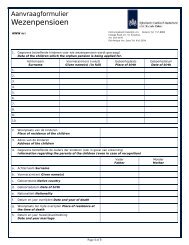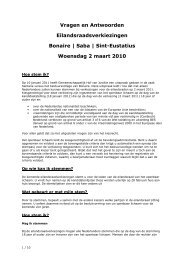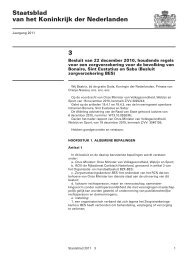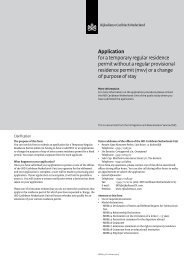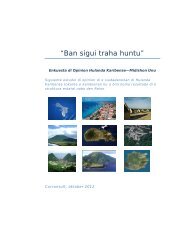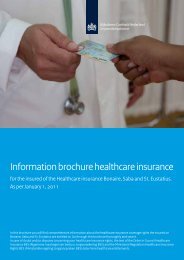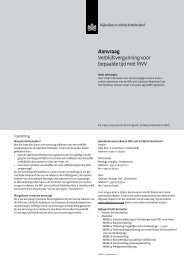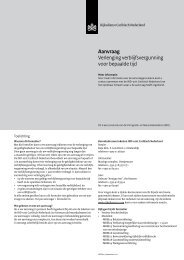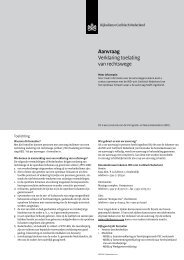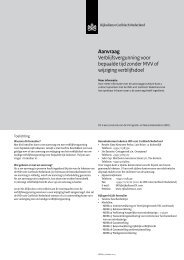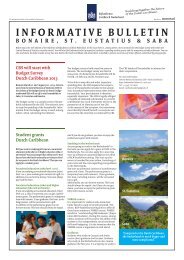The educational system of the Dutch Caribbean - Rijksdienst ...
The educational system of the Dutch Caribbean - Rijksdienst ...
The educational system of the Dutch Caribbean - Rijksdienst ...
- No tags were found...
Create successful ePaper yourself
Turn your PDF publications into a flip-book with our unique Google optimized e-Paper software.
01.0<strong>The</strong> <strong>educational</strong> <strong>system</strong><strong>of</strong> <strong>the</strong> <strong>Dutch</strong> <strong>Caribbean</strong>ENG<strong>The</strong> <strong>educational</strong> <strong>system</strong> <strong>of</strong><strong>the</strong> <strong>Dutch</strong> <strong>Caribbean</strong>Starting August 1 st , 2011 schools in Bonaire, St. Eustatius and Saba will formpart <strong>of</strong> <strong>the</strong> <strong>Dutch</strong> <strong>educational</strong> <strong>system</strong>. As <strong>of</strong> that date schools will be applying<strong>the</strong> <strong>Dutch</strong>-<strong>Caribbean</strong> education laws. <strong>The</strong>se laws are based mainly on <strong>the</strong><strong>Dutch</strong> education laws, but are adapted to <strong>the</strong> particular circumstances in <strong>the</strong><strong>Dutch</strong> <strong>Caribbean</strong>.Characteristics <strong>of</strong> <strong>the</strong> <strong>Dutch</strong> education <strong>system</strong>• Freedom <strong>of</strong> education (Article 23 <strong>of</strong> <strong>the</strong> Constitution):• One is free to found a school and to provide education based on specificphilosophic principles or religion. This means that apart from public schools <strong>the</strong>reare also denominational schools. In <strong>the</strong> Constitution public and denominationalschools are treated equally in financial sense. In <strong>the</strong> education laws <strong>the</strong>re areregulations that denominational schools have to meet in order to become eligiblefor defrayal.• <strong>The</strong> government determines <strong>the</strong> ‘what’ and <strong>the</strong> school <strong>the</strong> ‘how’:• <strong>The</strong> government determines ‘what’ should be taught, but it is <strong>the</strong> school thatdetermines ‘how’ pupils are taught.• Quality requirements are in place regarding <strong>the</strong> education (<strong>the</strong> ‘what’). <strong>The</strong>serequirements apply to both public and denominational schools and concernprescription <strong>of</strong> subjects to be studied, core targets/examination programs and <strong>the</strong>contents <strong>of</strong> national examinations, number <strong>of</strong> teaching periods per year, requiredteaching qualifications, participation and planning and reporting obligations.• <strong>The</strong> Kingdom government (in this case <strong>the</strong> minister <strong>of</strong> Education, Cultureand Science) directs <strong>the</strong> education applying laws and regulations, <strong>the</strong>reby takinginto account stipulations <strong>of</strong> <strong>the</strong> Constitution. <strong>The</strong> most important tasks <strong>of</strong> <strong>the</strong>government regarding <strong>the</strong> education are <strong>the</strong> structuring and defrayal (lumpsum), <strong>the</strong> care for public schools, <strong>the</strong> supervision on education, examination andstudent financial aid.• <strong>The</strong> Inspectorate <strong>of</strong> Educationsupervises <strong>the</strong> quality and structure<strong>of</strong> <strong>educational</strong> programs in schools.• <strong>The</strong> local government isresponsible for student transportation,<strong>the</strong> housing enmaintenance <strong>of</strong> schools, <strong>the</strong>execution <strong>of</strong> <strong>the</strong> Youth SocialOpportunity Program (successor to<strong>the</strong> Compulsory Social EducationalProgram), adult education, <strong>the</strong>execution <strong>of</strong> <strong>the</strong> CompulsoryEducation Law, and for publiceducation.• Schools have a legally recognizedcompetent authority, <strong>the</strong> schoolboard. <strong>The</strong> school board administratesand manages schools. <strong>The</strong>administration <strong>of</strong> schools entails<strong>the</strong> care for material aspects <strong>of</strong> <strong>the</strong>school organization, especially <strong>the</strong> management <strong>of</strong> operational costs and costs<strong>of</strong> personnel. <strong>The</strong> management <strong>of</strong> schools entails <strong>the</strong> setting <strong>of</strong> <strong>the</strong> contents<strong>of</strong> <strong>educational</strong> policy, <strong>the</strong> human resources policy (appointment, dismissal,etc.) and <strong>the</strong> student admission policy. <strong>The</strong> school board is responsible for <strong>the</strong>developments in <strong>the</strong> schools provided <strong>the</strong>re is a legal basis. Delegation <strong>of</strong> somecompetencies to school management is possible, but <strong>the</strong> school board remainsultimately responsible.
Compulsory education and initial qualificationsSchematic representation <strong>of</strong> <strong>the</strong> education <strong>system</strong>• Pupils are subject to compulsory education from <strong>the</strong> age <strong>of</strong> 4 till <strong>the</strong> end <strong>of</strong><strong>the</strong> school year in which <strong>the</strong>y turn 16 years <strong>of</strong> age. <strong>The</strong> compulsory education isfollowed by a compulsory qualification, for those pupils that:• have not yet reached <strong>the</strong> age <strong>of</strong> 18;• have not attained <strong>the</strong> level <strong>of</strong> initial qualification (a diploma <strong>of</strong> ei<strong>the</strong>r havo,vwo or mbo (level 2) is regarded as initial qualification);• are no longer subject to <strong>the</strong> compulsory education.• <strong>The</strong> compulsory qualification is a measure to prevent pupils from droppingout, before reaching <strong>the</strong> initial qualification. <strong>The</strong> compulsory initial qualificationcommits all pupils that are not subject anymore to <strong>the</strong> compulsory education, anddo not have initial qualifications, to follow a full time <strong>educational</strong> program until<strong>the</strong>y have attained <strong>the</strong> initial qualification. This program must be a mixed learningpath, combining learning and working, as is <strong>the</strong> case with <strong>the</strong> mbo guidedvocational learning path.Types <strong>of</strong> schoolsTypes <strong>of</strong> educationPrimary schoolHigh school*• Practical education (pro)• Preparatory secondary vocational education (vmbo)• Senior secondary education (havo)• University preparatory education (vwo)Ages4-12 years12-18 years12-16 years12-17 years12-18 years212019181716151413121110987654wo (8)vwo (4)hbo (7)havo (3)po (1)= compulsary education + initial qualificationmbo (6)vmbo (2) pro (5)Senior secondary vocational education (4 levels)Higher education**• Pr<strong>of</strong>essional higher education (hbo)• University (wo)16-20 years17-21 years18-22 years* <strong>The</strong> <strong>educational</strong> <strong>system</strong> in Saba has some differences compared to <strong>the</strong> rest <strong>of</strong> <strong>the</strong> o<strong>the</strong>r islands <strong>of</strong><strong>the</strong> <strong>Dutch</strong> <strong>Caribbean</strong>. For <strong>the</strong> vmbo (and mbo – level 2) Saba applies <strong>the</strong> TVET-curriculum and forhavo <strong>the</strong> CXC-curriculum. TVET and CXC are <strong>Caribbean</strong> curricula.** Currently <strong>the</strong> <strong>Dutch</strong> <strong>Caribbean</strong> has no higher education except for an UNA branch on Bonaire.1. po: primairy education2. vmbo: junior secondary vocational education schools (previously vsbo)3. havo: senior secondary education4. vwo: university preparatory education5. pro: practical education (previously ago)6. mbo: senior secondary vocational education (previously sbo)7. hbo-bachelor: pr<strong>of</strong>essional higher education8. wo-bachelor + -master: universityExplanation <strong>of</strong> symbols on cover:School boardSchool managementTeacherLocal governmentThis folder is a publication <strong>of</strong>:<strong>Rijksdienst</strong> Caribisch Nederland, OCWdepartmentFor more information, please consult ourwebsite:www.rijksdienstcn.com



